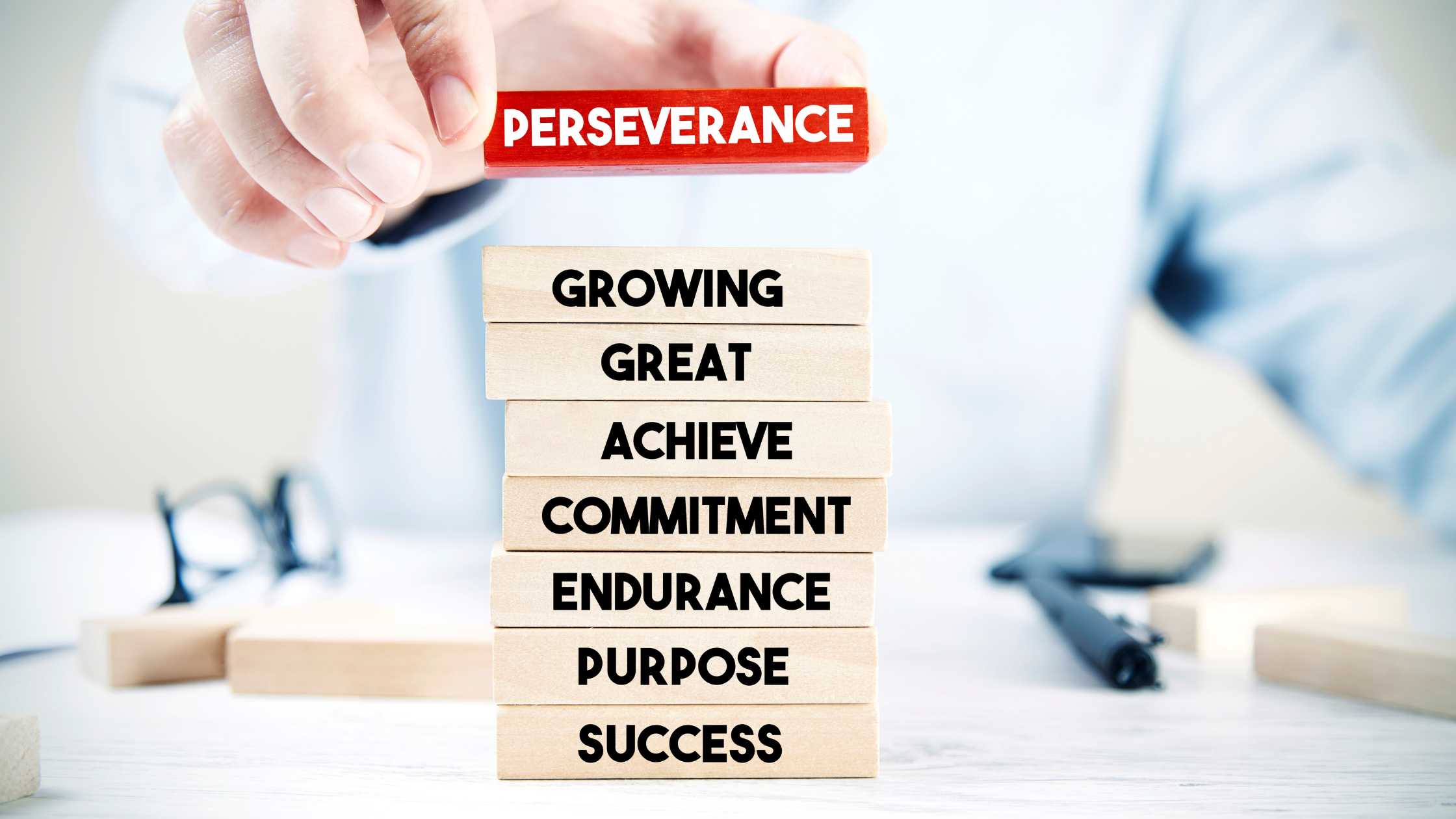There are so many traits, skills, and habits that make for a successful paralegal career. In this blog, I want to dive into three traits we haven’t discussed yet: accountability, professionalism, and perseverance.
We’ll explore why these are three traits of a rockstar paralegal and give you actionable strategies for developing them throughout your paralegal career.
Watch Video Replay
1. Accountability
Do you have accountability? I’m not asking if you’re being held accountable. Do you have internal accountability for your career, for the files you manage, for the projects you work on, and for the job you have?
What is Accountability?
First, let me give you the definition so we’re all on the same page. According to the dictionary, accountability is the fact or condition of being accountable.
Okay. Well, what is being accountable? It is an obligation or WILLINGNESS to accept responsibility or to account for one’s actions.
In other words, accountability is taking ownership of what you do.
You take ownership of your work, your cases, your transactions, your closings, your trademark filings, and that e-filing project.
Whatever it is that you do as a paralegal, you take ownership.
It also means that you take ownership of your mistakes.
Read How Failure Can Benefit Your Paralegal Career.
Accountability vs. Responsibility
What is the difference between responsibility and accountability? Well, responsibility is what you HAVE to do. For example, it’s part of your job responsibility.
With accountability, you own it, and you make it happen. It’s a mindset that this project will not fail on my watch.
I had a paralegal in our NYC office who was the lead paralegal on a big commercial arbitration, and it was sometime in the middle of winter. Part of the stipulations in this arbitration was that each side would exchange exhibits that they intended to use at least 24 hours in advance of using them in the arbitration. I was up there working in the NY office that week and had several conversations with the paralegal…one of which was about the impending snowstorm.
What the team was typically doing was preparing the exhibit notebooks and delivering them at the close of business or first thing in the morning (like 8 a.m.) so that they could then use them the next day.
Now you might be asking, why not deliver the entire week’s notebooks on Friday before so that they wouldn’t have to worry about exhibits for the entire week? Well, because both sides were playing this game of not wanting to give the other side too much advance notice of what they were going to be using for exhibits.
Learn how to be a confident paralegal.

I know…leave it to the lawyers to devise that strategy. But the paralegal’s attitude was, “it is what it is, so I’ll figure out a way to make it work.” And she did make it work seamlessly for weeks. Yes, weeks.
They were five weeks in and had at least another five weeks to go. It worked seamlessly (or at least she made it look that way) until a snowstorm.
Anyone who lives in a state where it snows will get this. Especially if you live in a major metropolitan city that relies on public transportation. Whenever there’s a weather event, it’s nearly impossible to hail a cab. Or nowadays, to get an Uber. But there was no Uber back then. It was all just the good old-fashioned yellow cabs. And when it rained or snowed in NYC, you could wait for hours out there trying to find one that had its vacant light on.
It was getting close to the deadline when these notebooks had to be delivered to the other side. So this paralegal throws on snow gear, grabs her box of 5-inch D Ring binders, puts the box inside a sealed garbage bag so they don’t get wet, and hails a pedicab.
Yes, a bicycle with a plastic covering on the back for the passenger to escape some of the weather. She calls the other side’s paralegal upon arrival down the street to get the notebooks so that she wouldn’t lose her pedicab ride back to the office.
That project was not going to fail on her watch.
Accountability is stepping up to make sure it’s done on time and right – regardless of your job title or who’s in charge. It’s one of the essential traits of a rockstar paralegal.
Here are 10 Things Attorneys Look For in a Paralegal.
What Does a Lack of Accountability Look Like?
Before I get into some actionable strategies to help with an accountability mindset and develop this trait of a rockstar paralegal, let’s talk about what a LACK of accountability looks like.
It means that you ignore feedback or you take constructive criticism personally. Your way is the right way, and no one should even dare to suggest there could be a better, more efficient way of doing things. Especially if you’ve been a paralegal for 30 years and that new paralegal comes in and tries to show you how to do it better when they’ve only got five years of experience.
A lack of accountability also shows up when you feel like you can just disregard policies and procedures that you feel are unnecessary or that shouldn’t apply to you.
Here’s a good example that I see a lot. Billable hours.
If you work in a law firm, particularly on the defense side, part of your job as a paralegal is to enter your billable time so the firm can bill its clients and collect revenue. But you’ve been working at the firm for 20 years for the same equity partner, and you know that partner provides a little bit of job security for you. So even though HR sends you an email that you’re behind on entering your time or maybe that you’re not billing enough…you do nothing.
Your view is that you can’t control how much work your attorney gives you, so even though the firm expects its paralegals to bill 1,500 hours per year, you don’t care or do anything proactive to try to hit that number. But then you’re upset at the end of the year when you hear through the grapevine that one of the other paralegals got a larger bonus than you did because she hit that billable hour target.

If You Don’t Own Your Career, You’re Lacking Accountability
Do you know what another aspect of accountability is? Taking ownership of your career. I talk about that a lot…I know! But it’s so important to your success.
Have you not received that on-the-job training that you thought you were going to receive? Go out and get it yourself.
Is your firm expecting you to know how to cite, check, and e-file summary judgment briefs, but no one has taken the time to show you how to do it? Go out and get the training.
If you have accountability for your career, then you understand that you and you alone control how successful your career is.
In Stephen Covey’s 7 Habits of Highly Effective People, he says that you have the ability to change your response to a situation or condition.
I watched this TEDx talk the other day. It was Janyssa Berrios who told the story about how she was an okay soccer player for ten years. She never really pushed herself. She was never consistent in her practice sessions. But she was okay, and at a time in her life when she had excuses for her other problems. Until one day, she decided she needed to start holding herself accountable. So she started wrestling. And instead of just mediocre participation, she took accountability for herself and gave it her all. She ended up being the first female wrestler to go to college on a wrestling scholarship.
In the TEDx talk, she said something that stuck with me. She said we all talk about how actions speak louder than words, but we forget that there are also consequences for inactions.
Are there inactions that could be holding back your paralegal career? Are there inactions that are causing you to make less money than your peers?
How to Raise Your Accountability Level
Look, don’t shoot the messenger. I’m here to help remind you of things you may not have thought about in a while. Because it happens to all of us. We start the year with good intentions and lofty goals, and then life happens. Before you know it, we’re five years into our paralegal career, and we forgot that a goal we set back then was to get that certification or graduate degree. Whatever it is that will help you do your job better and excel in your career where it doesn’t rely on someone down the hall. It’s only reliant on you holding yourself accountable.
Do these 3 things if you want to raise your accountability level:
-
- Be consistent.
- Take ownership (of your career, your projects, and your mistakes)
- Accept feedback (maybe even seek it out!)
I also want to give you a way to climb out of the excuses. We all make them from time to time. No one is perfect. But when you cut through the excuses, it’s easier to hold yourself accountable and exhibit the traits of a rockstar paralegal.
Litigation Paralegal Boot Camp
Are you tired of being the Panic Mode Paralegal who spends your days playing whack-a-mole with last-minute rush projects because you’re waiting for someone to show you what it takes to be great litigation paralegal?
This is the only program of its kind that provides litigation paralegals with all of the tools to master litigation cases from the complaint through the trial, and everything in between.
You will be the Confident Case Strategist faster than you ever imagined possible.

Stop Making Excuses
If you spot yourself making excuses, such as:
The attorney didn’t give me clear enough instructions.
No one’s ever taken the time to show me how to do it.
The attorney waits until the last minute to assign tasks to me.
Here’s what you should do:
1. Write them down and look for patterns.
Do they all kind of sound similar? Or are they all different? Is the pattern that every single day, you have at least one excuse written down?
2. Find a solution to those excuses.
Because an excuse is what you’re perceiving as the problem. Remember, I did an entire blog on How to be a Problem-Solving Paralegal. Problem-solving is the number one skill attorneys tell me that they look for in their paralegals. And this is why.
When you write that excuse down, ask yourself what a potential solution is. Use one of the problem-solving techniques I talked about in that blog. One of them was to write out the 5 W’s and 1H that journalists use when writing a thorough and complete story. Identify the Who, What, When, Where, Why, and How.
Let’s use “the attorney didn’t give me clear enough instructions,” and that’s why the project was wrong.
WHO else could you ask for clarification on the project?
WHAT were the instructions?
WHY did the project go wrong? Are you sure it was a lack of instructions and not something else? Why didn’t you ask the attorney to clarify the instructions?
HOW soon after you started the project did you know that you didn’t have enough clarification? How can you prevent this from happening again?
Seek a workaround to be a proactive paralegal. Remember that accountability encourages you to always look for an alternative solution, or a plan b, instead of throwing up your hands and saying that’s all I can do. It’s something I’ve seen as an important trait in all rockstar paralegals.
Get more tips on how to be a proactive litigation paralegal.

2. Professionalism
Most of us, myself included, immediately turn to how we’re dressed, how we look, and how we act in front of the client or a judge. While those things are important, I’m talking more about internal professionalism, a trait of rockstar paralegals not often discussed.
What is professionalism?
I’m talking about:
Confidence.
Work ethic.
Reliability.
Having a positive attitude.
It’s handling stress and pressure with grace; in other words, being the calm, not the storm. It’s being a team player and collaborating with others for the good of serving the client. That means helping out fellow paralegals, not just so that they don’t fail, but so that they are hugely successful because you understand that when you help make another paralegal look good to the attorneys, it elevates the entire paralegal profession. It’s avoiding the scarcity mindset.
Professionalism is avoiding the gossip group because you know that being seen as “one of them” will not serve you well in the long-term of your career.
It’s going above and beyond what is expected of you because you take great pride in your work.
When I think of professionalism, I think of the interview I did with Kim Bookout. She was a paralegal of mine back when I was a paralegal manager. She was the epitome of professionalism. I couldn’t define it back then, but during her interview, it was clear. One of the actionable strategies she had for those who want career mobility was to be kind to EVERYONE you come into contact with because you never know if that vendor will be your future boss or that paralegal down the hall is going to be your future client. She gives excellent examples of how to exhibit this trait of rockstar paralegals.
Read an Interview with Kim Bookout – Where Your Litigation Career Path Can Take You.

3. Perseverance
According to LifeHack.org, perseverance is the act of continuing to do something despite the difficulty or delay involved in success.
It’s the ability to survive curveballs. To deal with the challenges that life throws at us.
Think about that in terms of your paralegal career. The reason I bring this up is that I’ve done quite a few interviews for our paralegal inspiration podcast series, and one of the common themes and traits of rockstar paralegals I’ve been hearing from these paralegals is perseverance. Maybe they started, and it wasn’t a great job, but they didn’t give up on their paralegal career. They moved to a different practice area, a different firm, or a different team within the same firm. They kept trying until they found their dream job.
Perseverance is also:
Having the ability to pivot.
Being Adaptable.
Flexibility.
These skills help you come up with solutions to problems.
Now, combine all 3 of these traits of a rockstar paralegal into one person, accountability, professionalism, and perseverance – you are headed to a successful paralegal career. I have no doubt about it. I would also add patience to that. Have those three traits and a little patience, and there’s no stopping you.
Are you starting a new paralegal career in litigation?
Here’s what other paralegals are saying about the Litigation Paralegal Boot Camp:
Life-Changing Knowledge!
This course is what every paralegal job induction week should look like. Incredible amounts of tips and advice and just overall useful knowledge. These videos prevent you from going in blind to a new job, which, for me, is such a relief because the only thing you’re thinking about when you’re the new guy at work is, “Oh God, I hope I don’t screw up something and lose the case and get fired.” The materials given in this course certainly help ease your mind about what you’re supposed to do at each stage of the case you’ve been assigned. I cannot recommend this enough.
By Madeline Vargas-Lopez
Definitely, a must-course!
I was amazed how many of these lessons hit home as a working paralegal. We are the secretary and paralegal so this behavior module definitely helps to stop multi-tasking and focus on one task at a time and prioritize. I absolutely love this course. Thank you so much for sharing your skills and guiding us with sensible knowledge as well.
By Angela Grindle
Really helped me to understand and give me quick tips to help me succeed as a new paralegal.
Taking this class has been helpful in my start as a paralegal. When I started the class, I just started a new job. I am still at the firm, and I hope to continue building my experience to be a case manager.
By Kevin Chen
Meet the Author

Ann Pearson is the Founder of the Paralegal Boot Camp, and host of the Paralegals on Fire! Podcast Show, and passionate about promoting the paralegal profession.
Ann spent 20 years working as a paralegal manager and a litigation paralegal before opening the Paralegal Boot Camp in 2010.
Ann’s training programs focus on adding immediate value to a paralegal’s career and bridging the gap between what a paralegal learns in school and what they actually do on the job.
Visit the About Us Page to learn more about why Ann started the Paralegal Boot Camp.

























